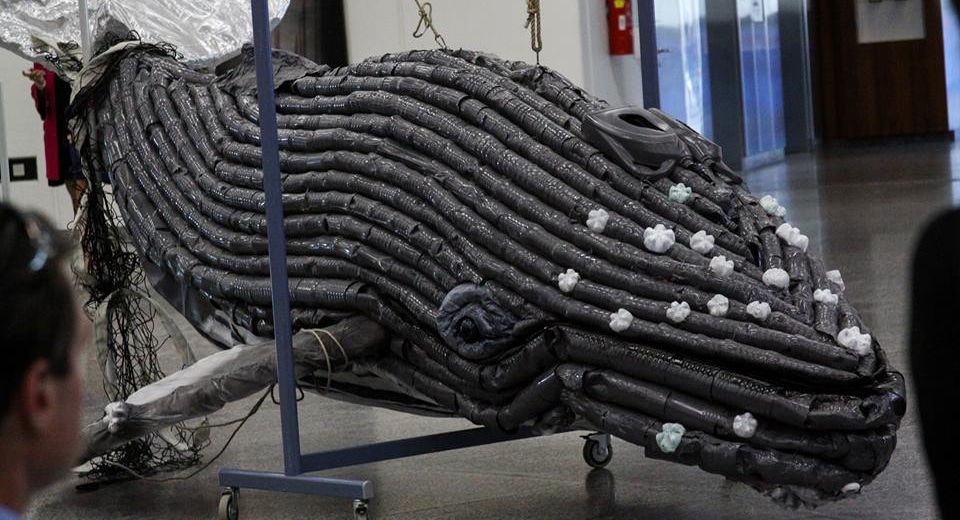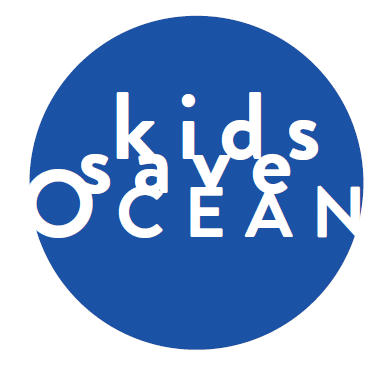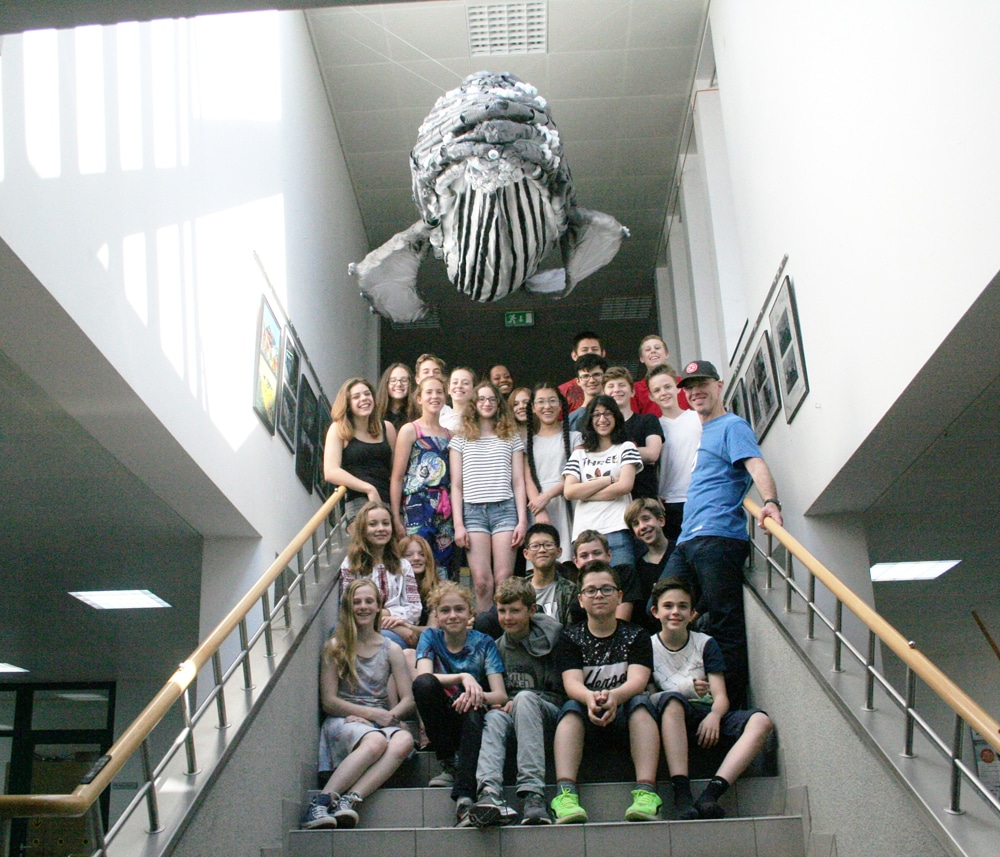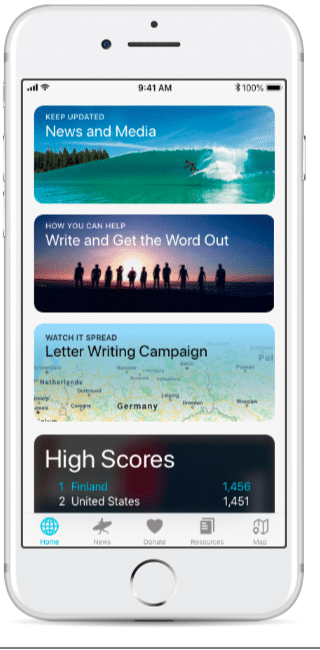Marine Life & Conservation
The Children’s Clean Ocean Summit

 This past June, nearly 300 kids from six Austrian schools gathered for the world’s first Children’s Clean Ocean Summit, titled “The Last Whale” and held at the United Nations in Vienna. The summit was run entirely by kids and involved them exploring the complex issue of plastic ocean pollution, teaching each other about solutions, then each voting for the three they found most critical. The summit culminated in the signing of their Children’s Clean Ocean Declaration, which shares their feelings and priorities and will be delivered to all world governments.
This past June, nearly 300 kids from six Austrian schools gathered for the world’s first Children’s Clean Ocean Summit, titled “The Last Whale” and held at the United Nations in Vienna. The summit was run entirely by kids and involved them exploring the complex issue of plastic ocean pollution, teaching each other about solutions, then each voting for the three they found most critical. The summit culminated in the signing of their Children’s Clean Ocean Declaration, which shares their feelings and priorities and will be delivered to all world governments.
The echoes of that event continue to resonate, finding their way so far into articles in six languages across the globe, and now to the world of scuba. It was an unprecedented event and may hopefully mark the beginning of new possibilities for children to powerfully participate in our world’s environmental narrative.
Here, Founder of the Kids Save Ocean Project, Peder Hill, shares their story:
How the Project Started – The Last Whale Sculpture
Children are deeply horrified by the growing tragedy of ocean plastic pollution. And two years ago the 12-year olds at my school and I (Peder (Mr. Hill), their art and biology teacher), decided to bring attention to the issue by building a 15-foot long humpback whale sculpture made from the same rubbish that desecrates our ocean’s beauty. We titled it “The Last Whale” in recognition of what will happen if we don’t change. After building it, however, we felt it wouldn’t change anything hanging in our school, as beautiful as it was. If it would have any impact, that whale, in spirit and in reality, would have to swim far beyond.
So we approached the United Nations with the concept of the summit, which they embraced, beginning a collaboration that would also include installation of the whale sculpture at the UN for the week that included World Environment Day and World Oceans Day, fulfilling its purpose. The whale is also scheduled for exhibition at Austria’s biggest aquarium, the Haus des Meeres, in 2020, after a new wind is finished. We’re seeking additional placements if you happen to know anybody.
The Project’s Massive Growth
I deeply believe that giving children a voice is vital to humanity’s future. And it turns out I definitely wasn’t the only one. To run a massive summit with just a teacher and a handful of scrappy passionate kids wouldn’t have been possible, so I turned to the global platform VolunteerMatch, and very quickly wonderful people from around the world joined me with the goal of empowering kids to not just learn about plastic ocean pollution, but DO something.
Hundreds of volunteers have come forward, including six app developers who are coding my Fatechanger app, an education and lobbying app designed to give kids a voice. Though unfinished, the app has already been taken up by the German Federal Ministry in its Ocean Plastics Lab international traveling exhibition, which showcases the contribution of science to understand and tackle the problem of plastics in the ocean. I’m currently in the process of forming the Kids Save Ocean non-profit to bring the project to scale.
20 Years Before in Cali
Long before fate swept me to Vienna, Austria, where I’d form the Kids Save Ocean project, and before the 200-plus volunteers flooded in to help me give kids a voice about the ocean and before the whale and the Summit at the UN and before being contacted by CNN about our efforts. Before all that, 20 years back, I remember a bolt blue sky above a clear Santa Cruz morning as my sister and I explored the hills of kelp heaped along the beach, washed up by the monster waves of a huge storm the night before. In amongst it were packages and containers from Japan, fishing gear, tourist beach trash, cigarette buts, even an ocean-cold Budweiser, which we promptly cracked and downed on the spot. Among piles of kelp, the global scatterlings of plastic junk.
In the two decades since that sunny harbinger of a morning, additional billions of pounds have accumulated in our seas, each piece of which will break down into tinier and tinier pieces, releasing toxins and being mistaken for food for hundreds of years. In another 20 years, what will our oceans look like? A frightening question.
Why form the Kids Save Ocean non-profit? Children deserve a voice in this world for one. And maybe, maybe, empowering them with a voice may be the help we so desperately need.
A Future: the Kids Save Ocean Mission Statement
Our core mission is to give children everywhere a voice about our planet’s environment, a mission we currently approach through our mobile app development, our work with the United Nations, and our exhibitions. Integral to that mission is providing teachers with a platform to deeply engage their students about plastic ocean pollution and the critically related issue of sustainability. We’re currently moving toward becoming a dynamic youth-centered non-profit to give children a powerful voice both now and forever.
For more information please visit the Kids Save Ocean website by clicking here.
Marine Life & Conservation
Paul Watson Released as Denmark Blocks Japan’s Extradition Bid

Renowned anti-whaling activist Paul Watson has been released from custody in Greenland after spending five months in detention. Denmark’s Justice Ministry rejected Japan’s request for his extradition, citing insufficient guarantees that his time already served in custody would be credited against any potential sentence.
The 74-year-old Canadian-American was arrested on July 21 in Nuuk, Greenland’s capital, when his ship docked to refuel. His arrest was based on a 2012 Japanese warrant related to a 2010 encounter in Antarctic waters. Japan alleged Watson obstructed operations and caused damage to a whaling research ship during efforts to disrupt illegal whaling. Watson has consistently denied these claims, maintaining his commitment to marine conservation.
Denmark, which oversees extradition matters for Greenland, concluded that while the legal conditions for extradition were met, the lack of assurances from Japan regarding time-served credit made extradition untenable.
In a video shared by his foundation, Watson expressed gratitude and relief, saying, “After five months, it’s good to be out… and good to know they’re not sending me to Japan.” He added that the most difficult part of his time in custody was being separated from his two young sons.
Watson is a pioneering figure in marine conservation, known for founding the Captain Paul Watson Foundation in 2022 after decades of activism with the Sea Shepherd Conservation Society. His bold efforts to defend marine life have earned him widespread support, including from celebrities and conservationists. His work has also been featured in the acclaimed reality TV series Whale Wars.
Watson’s lawyer, Jonas Christoffersen, praised the decision, stating, “We are happy and relieved that Paul Watson is now free.” He added that Watson is eager to reunite with his family and continue his vital work.
The arrest occurred while Watson’s vessel, the M/Y John Paul DeJoria, was en route to the North Pacific with a team of 26 volunteers to intercept a Japanese whaling ship. His foundation described the arrest as politically motivated and emphasized that Watson’s actions were focused on ending illegal whaling practices.
Japan resumed commercial whaling in 2019 after leaving the International Whaling Commission, asserting that whale meat is a cultural tradition. Conservationists, however, continue to challenge these practices, highlighting their impact on marine ecosystems.
Despite the challenges, Watson remains steadfast in his mission to protect marine life and bring attention to whaling practices. His dedication to ocean conservation has made him a globally respected advocate for the environment.
Marine Life & Conservation
12 Days of Zero-Waste Fish-mas

This holiday period, the Marine Conservation Society, the UK’s leading ocean membership charity, invites you to make some simple changes to eating fish this Christmas to help our seas.
Dr Kenneth Bodles, Head of Fisheries and Aquaculture at the Marine Conservation Society, said, “During the festive season, our consumption increases, but so does waste. Sustainability isn’t just about where food comes from – it’s also about how you use it. By reducing waste and making the most out of your seafood, you’re not only taking steps to be more ocean-friendly, but can also help to cut costs during what is often one of the most expensive times of the year”.
The Marine Conservation Society has compiled twelve tips on how to consume seafood sustainably with zero-waste this Christmas:
Buy whole fish instead of fillets
Instead of fillets, consider buying whole fish such as salmon, hake, or lemon sole. By adopting a “nose to tail” approach with cooking, whole-baked fish not only feeds a crowd, but also helps to minimise waste and maximise sustainability by using up every part of the animal, including bones, skin, and fat.
Make fish stock
Leftover fish bones or shells can be put to good use by boiling them to make a nourishing fish stock or bisque. This can be frozen and preserved for later use and makes for a flavourful base in a soup.
Make your own fish pâté
Avoid waste by turning leftover fish, such as smoked mackerel or salmon, into a delicious pâté by blending with cream cheese and lemon. Perfect when paired with crackers.
The sustainability of salmon and mackerel varies depending on where and how it is caught or farmed. For more information on green-rated options, check the charity’s Good Fish Guide.
Buy frozen
By purchasing seafood that is frozen or vacuum-packed, this helps to reduce waste by extending the shelf life of your food.
Fish pie
If you’re wondering what to do with leftover cooked fish, why not opt for a classic fish pie with mashed potatoes, leeks, and a cheesy sauce? A sure crowd pleaser on Boxing Day.
Use the head
Don’t forget the fish head! The meat is incredibly tender and flavourful. The charity recommends a cod’s head curry or recreating Fallow’s renowned cod’s head in siracha butter.
By stretching your ingredients further, not only is this a more sustainable way to enjoy seafood, but also cost-effective by repurposing leftovers and cooking creatively.
Boxing Day brunch
Mix leftover kippers or smoked salmon with scrambled eggs for a tasty, zero-waste, Boxing Day brunch.
For best choice, make sure you buy kippers, or herring, from the North Sea and the North Irish Sea.
Zero-waste storage
A top tip from the Marine Conservation Society to avoid waste is freezing fish offcuts to save for future use.
Crisp up the skin
Even leftover fish skin can be turned into a quick savoury snack by crisping it up in an air fryer with a little olive oil and salt.
Anchovies two ways
Leftover anchovies can either be blended with butter to make a delicious anchovy butter or tossed into pasta for a hit of umami flavour.
The charity recommends opting for anchovies caught in the Bay of Biscay for best choice.
Fishcakes
For an easy, zero-waste meal, leftover seafood trimmings can be mixed with mash and fried in breadcrumbs to make fishcakes.
Pickled mussels
Try pickling mussels in 1:1 vinegar and water, with a dash of sugar for a sustainable, zero-waste snack that can be enjoyed well beyond the festive season.
Mussels farmed in the UK are a seafood superhero. Grown using low-impact methods and harvested by hand, they get all the food they need from the sea around them. This makes them one of the most sustainable, ocean-friendly, and cost-effective seafood options.
Players of People’s Postcode Lottery have raised £6.6M towards the Marine Conservation Society’s vital work in making seafood more sustainable.
Laura Chow, Head of Charities at People’s Postcode Lottery, said: “Fish is a festive favourite for many, but making sustainable choices when it comes to how we buy and eat seafood makes all the difference for our ocean. Support from players of People’s Postcode Lottery has helped the Marine Conservation Society further its sustainable seafood work, so that we can all enjoy healthier, better protected seas.”
The Marine Conservation Society encourages you to make sustainable seafood choices a year-round habit, not just for Christmas. To check how sustainable the seafood on your plate is, you can visit the charity’s Good Fish Guide. The Guide helps consumers and businesses identify the most sustainable seafood using a simple traffic light system, based on where and how species are caught or farmed. Green is the best choice, amber means improvements are needed, and red indicates fish to avoid buying.
Zero-waste gift idea
Why not embrace a zero-waste Christmas by gifting a membership to support marine conservation? It’s a meaningful, low-waste gift that helps protect our ocean for generations to come. Memberships start from as little as £5 a month – the price of a sandwich and drink from your local coffee shop.
Find the latest sustainable seafood advice for wild-caught and farmed seafood on the Good Fish Guide, downloadable to your phone from www.mcsuk.org/goodfishguide.
-

 News3 months ago
News3 months agoIconic SS United States to become the World’s Largest Artificial Reef
-

 Blogs2 months ago
Blogs2 months agoScubaverse Christmas Gift Guide 2024: Day 4
-

 News2 months ago
News2 months agoSanta Divers take the Plunge for Charity
-

 Blogs2 months ago
Blogs2 months agoScubaverse Christmas Gift Guide 2024: Day 1
-

 News3 months ago
News3 months agoDiscover Turquoise Divers and Media Luna Beach & Dive Resort: A Premier Diving and Relaxation Destination in Roatan
-

 Blogs2 months ago
Blogs2 months agoScubaverse Christmas Gift Guide 2024: Day 5
-

 Blogs2 months ago
Blogs2 months agoScubaverse Christmas Gift Guide 2024: Day 2
-

 News3 months ago
News3 months agoToucan Diving at Plaza Beach and Dive Resort Bonaire Introduces PADI Mermaid Training





